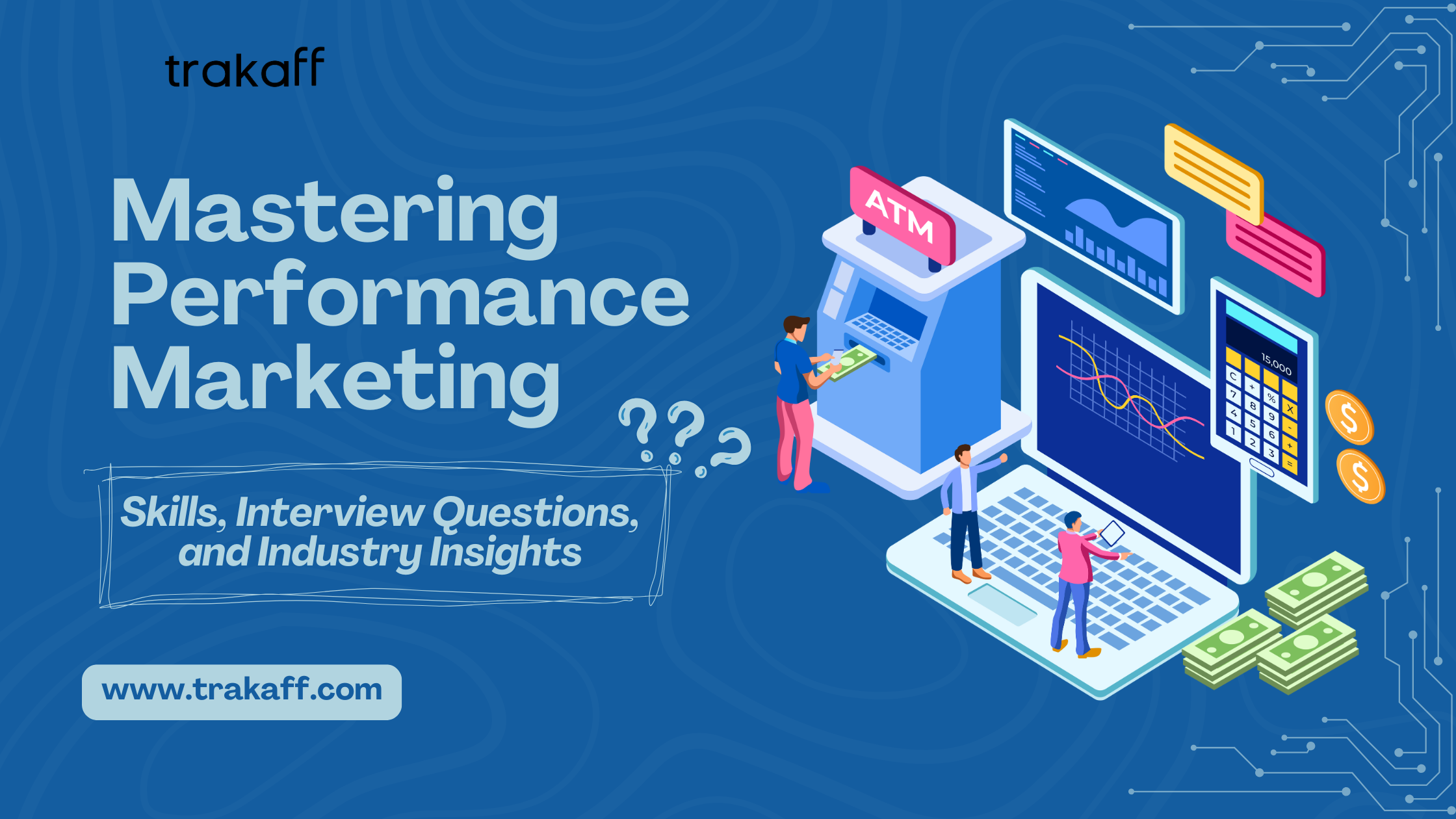In today’s digital landscape, performance marketing has become a crucial component of any successful business strategy. With the power to drive targeted traffic, generate leads, and boost sales, performance marketing has become an essential skill for marketers worldwide. In this comprehensive guide, we’ll explore the key aspects of performance marketing, the skills required, common interview questions, and the importance of this dynamic field.

What is performance marketing?
Performance marketing is a form of digital marketing that focuses on measurable results and pays only when specific actions are completed. Unlike traditional marketing methods, performance marketing relies on data-driven strategies to optimize campaigns and maximize return on investment (ROI). Common performance marketing channels include paid search, display advertising, affiliate marketing, and social media marketing.
Importance of Performance Marketing
1. Measurable Results
One of the primary benefits of performance marketing is its ability to provide measurable results. With advanced analytics tools, marketers can track key performance indicators (KPIs) such as click-through rates, conversion rates, and return on ad spend (ROAS). This data-driven approach allows businesses to make informed decisions and optimize their campaigns for better performance.
2. Cost-Effective

Performance marketing is often more cost-effective than traditional marketing methods. Since marketers only pay when specific actions are completed (e.g., clicks, leads, or sales), they can minimize wasted ad spend and maximize their ROI. This pay-for-performance model makes performance marketing an attractive option for businesses of all sizes.
3. Targeted Audience
Performance marketing allows marketers to reach their target audience with pinpoint accuracy. By leveraging advanced targeting options such as demographics, interests, and behaviors, marketers can create highly targeted campaigns that resonate with their intended audience. This targeted approach increases the likelihood of conversions and helps businesses reach their desired goals.
4. Scalability
Performance marketing campaigns can be easily scaled based on their performance. Marketers can start with a small budget and gradually increase their spend as they see positive results. This scalability allows businesses to grow their online presence and reach new audiences without significant upfront costs.
Essential Skills for Performance Marketing
To excel in performance marketing, professionals need to possess a combination of technical and soft skills. Some of the key skills required include:
1. Data Analysis
Performance marketing relies heavily on data analysis to optimize campaigns and maximize ROI. Marketers must be proficient in using analytics tools such as Google Analytics, Adobe Analytics, and Facebook Ads Manager to track KPIs and gain insights into campaign performance. The ability to interpret data and draw actionable conclusions is crucial for success in performance marketing.
2. Technical Expertise
Performance marketing involves working with various platforms, tools, and technologies. Marketers should have a solid understanding of web analytics, tracking pixels, and conversion tracking. Familiarity with programming languages such as HTML, CSS, and JavaScript can also be beneficial for creating and optimizing landing pages and ads.
3. Creative Thinking
While data and technology play a significant role in performance marketing, creativity is equally important. Marketers must be able to craft compelling ad copy, design eye-catching visuals, and develop innovative strategies to capture the attention of their target audience. Creative thinking helps differentiate a brand from competitors and resonates with consumers.
4. Strategic Planning
Performance marketing requires strategic planning to achieve long-term goals. Marketers must be able to set clear objectives, develop targeted strategies, and allocate resources effectively. The ability to analyze market trends, identify opportunities, and adapt to changing consumer behavior is essential for successful performance marketing campaigns.
Common Interview Questions for Performance Marketing Roles
When applying for performance marketing roles, candidates can expect to encounter a variety of questions related to their skills, experience, and knowledge. Some common interview questions include:
- Can you describe your experience with performance marketing and the channels you’ve worked with?
- How do you approach keyword research and selection for PPC campaigns?
- Can you share an example of a successful performance marketing campaign you’ve managed?
- How do you optimize landing pages for better conversion rates?
- How do you measure the success of a performance marketing campaign?
- How do you stay up-to-date with the latest trends and best practices in performance marketing?
- Can you explain the concept of attribution modeling and
- Can you explain the concept of attribution modeling and how it can be used to optimize performance marketing campaigns?
- How do you collaborate with cross-functional teams to ensure the success of performance marketing initiatives?
- Can you discuss your experience with audience segmentation and targeting in performance marketing?
- How do you approach testing and optimization in performance marketing to maximize ROI?
Answering these questions effectively requires candidates to provide specific examples, demonstrate their expertise, and highlight their problem-solving skills. Preparing for these common interview questions can help candidates showcase their value and stand out from the competition.
The Future of Performance Marketing
As technology continues to evolve, performance marketing is expected to grow and adapt to new challenges and opportunities. Some key trends shaping the future of performance marketing include:
1. Artificial Intelligence and Machine Learning
Artificial intelligence (AI) and machine learning (ML) are becoming increasingly integral to performance marketing. These technologies can automate tasks, optimize campaigns, and provide predictive insights to help marketers make data-driven decisions. As AI and ML advance, performance marketing will become more efficient and effective.
2. Voice Search and Conversational Marketing
With the rise of voice assistants and smart speakers, voice search and conversational marketing are emerging as important trends in performance marketing. Marketers must optimize their campaigns for voice search queries and create engaging, conversational experiences to connect with consumers on a deeper level.
3. Augmented Reality and Virtual Reality
Augmented reality (AR) and virtual reality (VR) are poised to revolutionize performance marketing. These immersive technologies can create interactive and personalized experiences that engage consumers and drive conversions. As AR and VR become more accessible, performance marketers will need to adapt their strategies to incorporate these innovative tools.
4. Privacy and Data Regulations
As data privacy concerns continue to rise, performance marketing must adapt to new regulations and best practices. Marketers must prioritize transparency, obtain consumer consent, and protect user data to comply with laws such as GDPR and CCPA. Adapting to these changes will be crucial for the future success of performance marketing.
Conclusion
Performance marketing is a dynamic and vital field that offers immense opportunities for businesses to achieve their marketing goals. By mastering essential skills, staying up-to-date with industry trends, and adapting to new challenges, performance marketers can deliver measurable results and drive growth. Whether you’re a seasoned professional or just starting your career, this comprehensive guide provides the insights and knowledge needed to succeed in this exciting and rewarding field. Embrace the power of data-drivendecision-making,, prioritize continuous learning, and let your passion for performance marketing guide you to new heights of success.